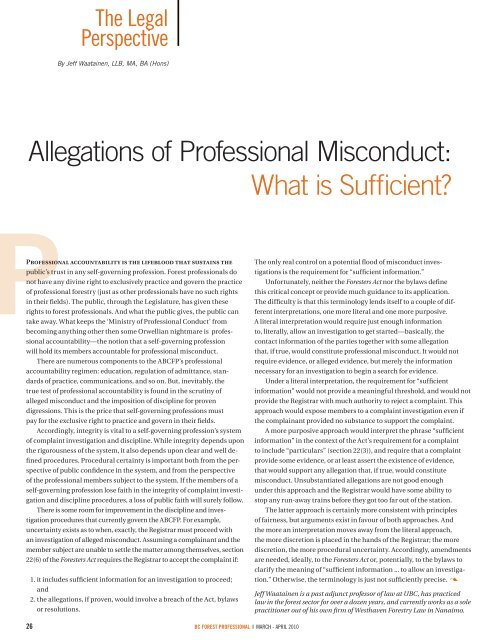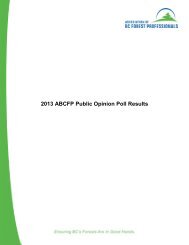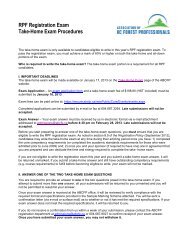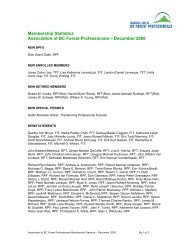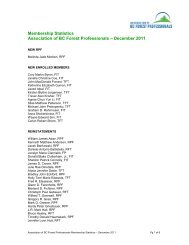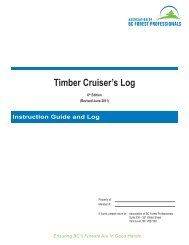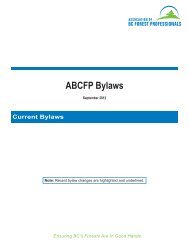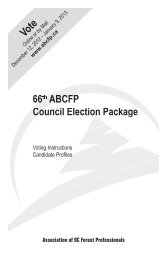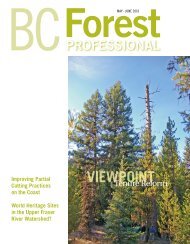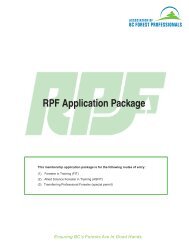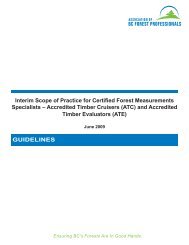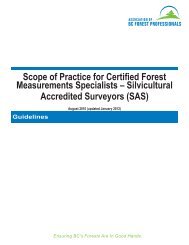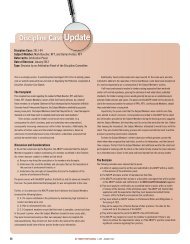VIEWPOINT - Association of BC Forest Professionals
VIEWPOINT - Association of BC Forest Professionals
VIEWPOINT - Association of BC Forest Professionals
You also want an ePaper? Increase the reach of your titles
YUMPU automatically turns print PDFs into web optimized ePapers that Google loves.
The legal<br />
perspective<br />
By Jeff Waatainen, LLB, MA, BA (Hons)<br />
Allegations <strong>of</strong> Pr<strong>of</strong>essional Misconduct:<br />
What is Sufficient?<br />
Pr<strong>of</strong>essional accountability is the lifeblood that sustains the<br />
public’s trust in any self-governing pr<strong>of</strong>ession. <strong>Forest</strong> pr<strong>of</strong>essionals do<br />
not have any divine right to exclusively practice and govern the practice<br />
<strong>of</strong> pr<strong>of</strong>essional forestry (just as other pr<strong>of</strong>essionals have no such rights<br />
in their fields). The public, through the Legislature, has given these<br />
rights to forest pr<strong>of</strong>essionals. And what the public gives, the public can<br />
take away. What keeps the ‘Ministry <strong>of</strong> Pr<strong>of</strong>essional Conduct’ from<br />
becoming anything other then some Orwellian nightmare is pr<strong>of</strong>essional<br />
accountability—the notion that a self-governing pr<strong>of</strong>ession<br />
will hold its members accountable for pr<strong>of</strong>essional misconduct.<br />
There are numerous components to the A<strong>BC</strong>FP’s pr<strong>of</strong>essional<br />
accountability regimen: education, regulation <strong>of</strong> admittance, standards<br />
<strong>of</strong> practice, communications, and so on. But, inevitably, the<br />
true test <strong>of</strong> pr<strong>of</strong>essional accountability is found in the scrutiny <strong>of</strong><br />
alleged misconduct and the imposition <strong>of</strong> discipline for proven<br />
digressions. This is the price that self-governing pr<strong>of</strong>essions must<br />
pay for the exclusive right to practice and govern in their fields.<br />
Accordingly, integrity is vital to a self-governing pr<strong>of</strong>ession’s system<br />
<strong>of</strong> complaint investigation and discipline. While integrity depends upon<br />
the rigorousness <strong>of</strong> the system, it also depends upon clear and well defined<br />
procedures. Procedural certainty is important both from the perspective<br />
<strong>of</strong> public confidence in the system, and from the perspective<br />
<strong>of</strong> the pr<strong>of</strong>essional members subject to the system. If the members <strong>of</strong> a<br />
self-governing pr<strong>of</strong>ession lose faith in the integrity <strong>of</strong> complaint investigation<br />
and discipline procedures, a loss <strong>of</strong> public faith will surely follow.<br />
There is some room for improvement in the discipline and investigation<br />
procedures that currently govern the A<strong>BC</strong>FP. For example,<br />
uncertainty exists as to when, exactly, the Registrar must proceed with<br />
an investigation <strong>of</strong> alleged misconduct. Assuming a complainant and the<br />
member subject are unable to settle the matter among themselves, section<br />
22(6) <strong>of</strong> the <strong>Forest</strong>ers Act requires the Registrar to accept the complaint if:<br />
1. it includes sufficient information for an investigation to proceed;<br />
and<br />
2. the allegations, if proven, would involve a breach <strong>of</strong> the Act, bylaws<br />
or resolutions.<br />
26 <strong>BC</strong> FOREST PROFESSIONAL | MARCH - ApRil 2010<br />
The only real control on a potential flood <strong>of</strong> misconduct investigations<br />
is the requirement for “sufficient information.”<br />
Unfortunately, neither the <strong>Forest</strong>ers Act nor the bylaws define<br />
this critical concept or provide much guidance to its application.<br />
The difficulty is that this terminology lends itself to a couple <strong>of</strong> different<br />
interpretations, one more literal and one more purposive.<br />
A literal interpretation would require just enough information<br />
to, literally, allow an investigation to get started—basically, the<br />
contact information <strong>of</strong> the parties together with some allegation<br />
that, if true, would constitute pr<strong>of</strong>essional misconduct. It would not<br />
require evidence, or alleged evidence, but merely the information<br />
necessary for an investigation to begin a search for evidence.<br />
Under a literal interpretation, the requirement for “sufficient<br />
information” would not provide a meaningful threshold, and would not<br />
provide the Registrar with much authority to reject a complaint. This<br />
approach would expose members to a complaint investigation even if<br />
the complainant provided no substance to support the complaint.<br />
A more purposive approach would interpret the phrase “sufficient<br />
information” in the context <strong>of</strong> the Act’s requirement for a complaint<br />
to include “particulars” (section 22(3)), and require that a complaint<br />
provide some evidence, or at least assert the existence <strong>of</strong> evidence,<br />
that would support any allegation that, if true, would constitute<br />
misconduct. Unsubstantiated allegations are not good enough<br />
under this approach and the Registrar would have some ability to<br />
stop any run-away trains before they got too far out <strong>of</strong> the station.<br />
The latter approach is certainly more consistent with principles<br />
<strong>of</strong> fairness, but arguments exist in favour <strong>of</strong> both approaches. And<br />
the more an interpretation moves away from the literal approach,<br />
the more discretion is placed in the hands <strong>of</strong> the Registrar; the more<br />
discretion, the more procedural uncertainty. Accordingly, amendments<br />
are needed, ideally, to the <strong>Forest</strong>ers Act or, potentially, to the bylaws to<br />
clarify the meaning <strong>of</strong> “sufficient information ... to allow an investigation.”<br />
Otherwise, the terminology is just not sufficiently precise. 3<br />
Jeff Waatainen is a past adjunct pr<strong>of</strong>essor <strong>of</strong> law at U<strong>BC</strong>, has practiced<br />
law in the forest sector for over a dozen years, and currently works as a sole<br />
practitioner out <strong>of</strong> his own firm <strong>of</strong> Westhaven <strong>Forest</strong>ry Law in Nanaimo.


